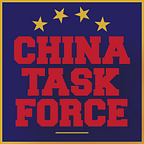Rep. Mike Gallagher in the Wall Street Journal: Yes, America Is in a Cold War With China
Rep. Mike Gallagher serves on the Technology and Ideological Competition pillars of the China Task Force. This Op-Ed was originally published in The Wall Street Journal.
A new cold war is heating up between the U.S. and China, but America’s public intellectuals are more interested in fighting about whether to call this confrontation a “new cold war.”
The phrase has been in the lexicon for a while. Historian (and Journal columnist) Walter Russell Mead has deployed it many times since Vice President Mike Pence’s 2018 speech at the Hudson Institute, then the most comprehensive articulation of the Trump administration’s approach to China. Author Robert Kaplan argued in January 2019 that a new cold war had started between the U.S. and China. Later that year historian Niall Ferguson said “Cold War II” had begun. Henry Kissinger has also warned that “we are in the foothills of a cold war.”
China has pushed back. Two weeks ago Foreign Minister Wang Yi accused “U.S. political forces” of pushing the two countries to “the brink of so-called new cold war.” Almost daily a Chinese Communist Party apparatchik accuses American officials of “Cold War thinking” or “summoning the ghosts of McCarthyism,” to take two recent examples. Last month Max Baucus, a former U.S. senator and ambassador to China, echoed these talking points on both CNN International and Chinese state television, comparing President Trump to Joseph McCarthy and, yes, Hitler.
More measured objections to the new-cold-war language have come from observers such as Robert Zoellick, a former World Bank president, and Richard Haass, president of the Council on Foreign Relations. They and others are concerned that the phrase will either give the Chinese Communist Party a propaganda victory or create a self-fulling prophecy.
Like it or not, the new cold war is a reality. Better to acknowledge it than to hope for an elusive, cooperative relationship. New cold warriors aren’t trying to reanimate the original Cold War. Most obviously, Communist China isn’t the Soviet Union. Communist China is a more formidable economic rival to the U.S. than Soviet Russia ever was, and America and China are more deeply connected than the U.S. and the U.S.S.R. were. America and the Soviet Union occasionally sought economic integration as a means of de-escalation. But American national security now demands some form of economic breakup with China, at least in certain industries.
Yet lessons from the Cold War apply. For example, though a cottage industry calls for “Sputnik Moments” to galvanize new “Manhattan Projects” or “Marshall Plans” to keep up with China’s investments in things like artificial intelligence, cyber and quantum computing, it seems prudent to invest in research and development of new technologies and aggressively work to restore a posture of deterrence in cyberspace. The “bipartisan foreign-policy consensus” of the Cold War is romanticized and exaggerated, but there seems to be some cross-party agreement on confronting the Communist Party. Joe Biden and Mr. Trump are attacking each other for being weak on China. Progressives are joining hawkish Republicans in criticizing the Communist Party’s human rights abuses of Uighur Muslims.
